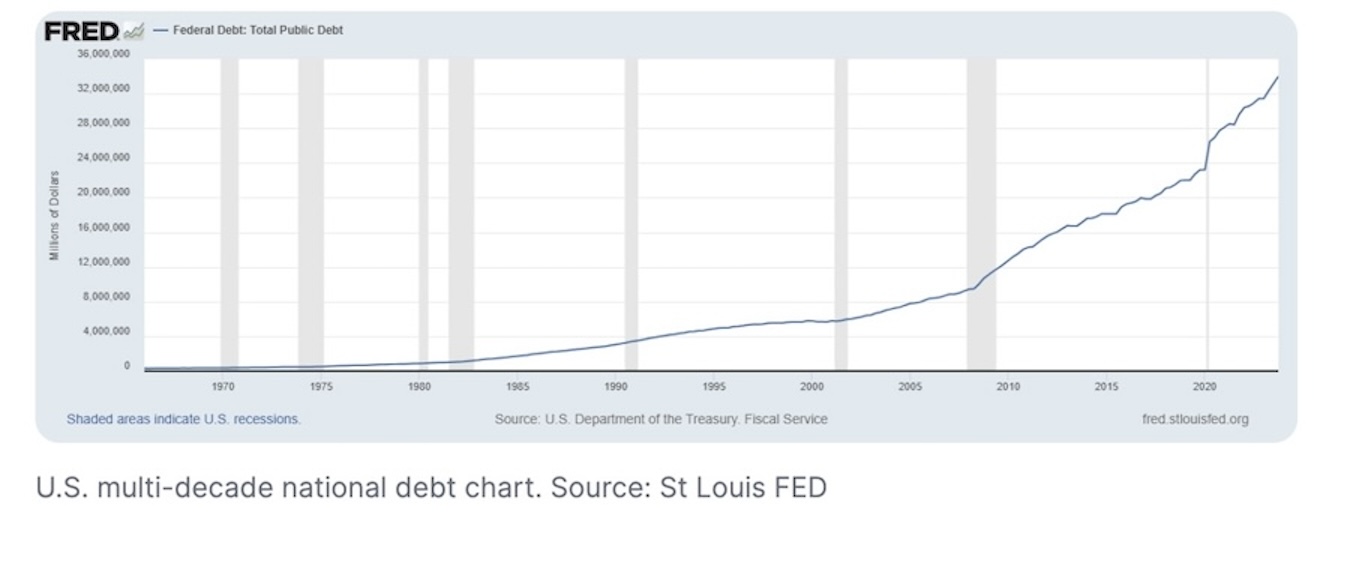DISARMAMENT & SECURITY .
A press survey and analysis by CPNN
For many years now, CPNN has carried a discussion page on this question, Does military spending lead to economic decline and collapse?
In his 1986 book, The Overburdened Economy, the economist Llloyd J. Dumas argued that in the long run military spending will undermine the ability of the economy to function efficiently; and cause a general decline in economic wellbeing. This is because it does not contribute to the standard of living as consumer goods do, or to the economy’s capacity to produce standard-of-living goods and services in the future, as producer goods do.
This analysis is repeated in his 2005 contribution to a symposium on The Political Economy of Military Spending.
Recent news articles by financial specialists suggest that the Dumas prediction is now coming true, in the form of the ballooning national debt of the United States.

The national debt based on data from the US Department of the Treasury Fiscal Service (click on image to enlarge)
I On May 2, The Economist ran an article with the headline “America’s reckless borrowing is a danger to its economy—and the world’s; Without good luck or a painful adjustment, the only way out will be to let inflation rip.” It blames “the costs of wars, a global financial crisis and pandemic, unfunded tax cuts and stimulus programmes.”
On May 1, Fortune Magazine summarized a number of financial sources as follows:
“The nation’s debt, currently over $34 trillion, is rampantly growing as U.S. lawmakers have been unable to agree to long-term budget reforms that could tame it.
“Officials from several institutions warn a tipping point is near and it will only get worse if it snowballs into a crisis. The national debt is currently almost the same size as the entire U.S. economy, which is roughly $27.3 trillion, according to a Council on Foreign Relations report, and is on track to double within the next thirty years.
(Article continued on the right column)
Does military spending lead to economic decline and collapse?
(Article continued from the left column)
“In the last few months, officials at several institutions including the International Monetary Fund, Congressional Budget Office and banking giant Goldman Sachs Group have cautioned that the country’s skyrocketing debt is a big problem–literally bigger than ever before–and some fear similar market chaos that derailed former UK Prime Minister Liz Truss’ economy when she was in office in 2022. . .
“In the U.S., IMF officials have warned that public spending and borrowing will “overheat” the country’s economy, while pushing up funding costs in the rest of the world. Phillip Swagel, the director of the Congressional Budget Office, said the country’s debt is on an “unprecedented” trajectory in an interview with the Financial Times, and could risk a Truss-style economic crisis. John Waldron, the president and COO of Goldman Sachs, expressed a similar concern at Semafor’s World Economic Summit on April 18.
With the exception of the passing mention of “the costs of wars” in the Economist article, it is notable that military spending is not mentioned in the many articles quoted here, even though it is the largest contribution to the national debt. It is “forgotten” just as another recent Economist article headlines “Budgetary blindness – America’s fiscal outlook is disastrous, but forgotten.”
The Economist article refers to the fact that the debt problem is “forgotten” by the two main Presidential candidates Joe Biden and Donald Trump. They continue to make the problem worse, as Biden increases military spending for the Ukraine, and Trump promises to reduce taxes on the rich.
Not mentioned are the positions of third party candidates Cornel West and Chase Oliver.
As reported in CPNN on April 6, Cornel West would address the debt problem by drastically cutting the military budget and instituting a wealth tax.>
And as reported in CPNN this week (May 29), Chase Oliver calls for “major cuts to the federal budget with an eye toward balancing the budget . . . and the closure of all overseas military bases and ending of military support to Israel and Ukraine.”
– – – – – –
If you wish to make a comment on this article, you may write to coordinator@cpnn-world.org with the title “Comment on (name of article)” and we will put your comment on line. Because of the flood of spam, we have discontinued the direct application of comments.